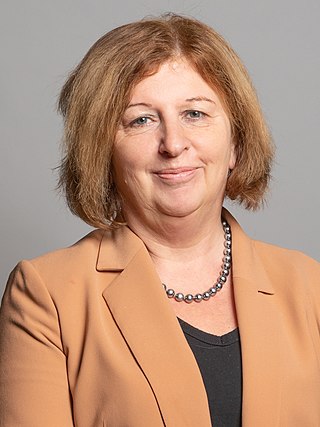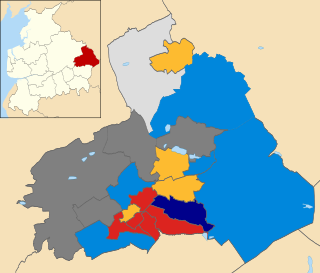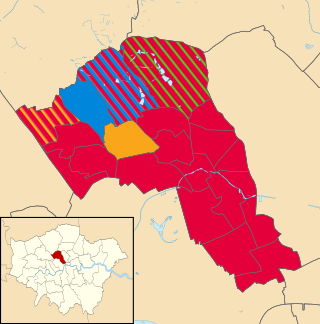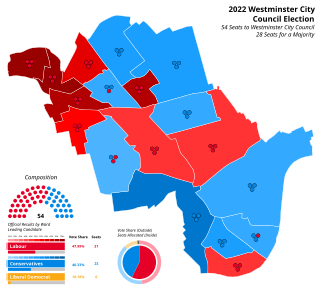Related Research Articles
Dame Shirley, Lady Porter DBE, is a British politician who led Westminster City Council in London from 1983 to 1991, representing the Conservative Party. She is the daughter and heiress of Sir Jack Cohen, the founder of Tesco supermarkets. She was appointed Dame Commander of the Order of the British Empire in 1991 by John Major after delivering victory in Westminster for the Conservatives in the 1990 local elections. While leader of Westminster City Council, Porter oversaw the "Building Stable Communities" policy — later described as the "homes for votes scandal" — and was consequently accused of gerrymandering. The policy was judged illegal by the district auditor, and a surcharge of £27m levied on her in 1996. This was later raised to £42 million with interest and costs. She eventually settled in 2004, paying a final settlement of £12.3 million.

Karen Patricia Buck is a British politician serving as Member of Parliament (MP) for Westminster North, previously Regent's Park and Kensington North, since 1997. A member of the Labour Party, she was Parliamentary Under-Secretary of State for Transport from 2005 to 2006 and served as Shadow Minister for Social Security from 2020 to 2023.

Westminster City Council is the local authority for the City of Westminster in Greater London, England. The city is divided into 20 wards, each electing three councillors. The council is currently composed of 31 Labour Party members and 23 Conservative Party members. The council was created by the London Government Act 1963 and replaced three local authorities: Paddington Metropolitan Borough Council, St Marylebone Metropolitan Borough Council and Westminster Borough Council.
Barry Charles Legg is a British politician. A former Conservative Member of Parliament (MP) for Milton Keynes South West from 1992 until the 1997 general election, he was defeated by Labour's Phyllis Starkey. Legg is the chairman of the Eurosceptic Bruges Group.

The Audit Commission was a statutory corporation in the United Kingdom. The commission's primary objective was to appoint auditors to a range of local public bodies in England, set the standards for auditors and oversee their work. The commission closed on 31 March 2015, with its functions being transferred to the voluntary, not-for-profit or private sector.
David Weeks was a former Conservative Leader of Westminster City Council who served on the council from 1974 to 1998.

The 1998 Solihull Metropolitan Borough Council election took place on 7 May 1998 to elect members of Solihull Metropolitan Borough Council in the West Midlands, England. One third of the council was up for election and the council stayed under no overall control.

Westminster City Council, the local authority of the City of Westminster in London, England, is elected every four years. Since the last boundary changes in 2002, 60 councillors have been elected from 20 wards. New boundary changes will come into effect for the 2022 elections, when the borough will be represented by 54 councillors in 18 three-member wards.

Porter v Magill [2001] UKHL 67 is a UK administrative law case decided by the House of Lords which arose out of the Homes for votes scandal involving Dame Shirley Porter.

The 2006 Solihull Metropolitan Borough Council election took place on 4 May 2006 to elect members of Solihull Metropolitan Borough Council in the West Midlands, England. One third of the council was up for election and the Conservative Party stayed in overall control of the council.

The 2008 Pendle Borough Council election took place on 1 May 2008 to elect members of Pendle Borough Council in Lancashire, England. One third of the council was up for election and the Liberal Democrats lost overall control of the council to no overall control.
The Westminster cemeteries scandal was a British political scandal which began in January 1987 when Westminster City Council (WCC) sold three cemeteries, three lodges, one flat, a crematorium and over 12 acres (4.9 ha) of prime development land in London for a total of 85 pence. The three cemeteries – Hanwell Cemetery, East Finchley Cemetery and Mill Hill Cemetery – were sold for 5 pence each. Shortly before the sale was finalised, one building had been withdrawn from the lot – because the council had failed to secure the eviction of a cemetery keeper – so WCC also paid the purchaser £70,000 compensation.
Shirleymander is a radio comedy drama written by Gregory Evans. It was inspired by Today journalist Andrew Hosken's book Nothing Like a Dame (2006). Shirleymander was first broadcast as the Friday Play by BBC Radio 4 on 27 November 2009. The play's title is a portmanteau referencing the gerrymandering policy adopted by Shirley Porter while leader of Westminster City Council in the 1980s which "forced homeless families to substandard housing in order to manipulate the borough's voting demographic."

Westminster City Council v Duke of Westminster was a case between Westminster City Council and the 6th Duke of Westminster heard in November 1990. The dispute concerned 532 flats in Page Street, Vincent Street and Regency Street, Pimlico, London. These had been designed by architect Sir Edwin Lutyens and erected between 1928 and 1930 for the 2nd Duke and the other family trustees. In 1937 the trustees leased them to the council on a 999-year lease containing the stipulation that they be used only as "dwellings for the working classes... and no other purpose."

The 2014 Westminster City Council election took place on 22 May 2014 to elect members of Westminster City Council in England. This was on the same day as other local elections.

The 2018 Oxford City Council election took place on 3 May 2018, to elect 24 of the 48 members of Oxford City Council in England. This was on the same day as other local elections in England. Each of Oxford's 24 wards elected one councillor, with the other seat in each ward next due for election in May 2020.

The 2022 London local elections took place on 5 May 2022, as part of the 2022 United Kingdom local elections. All London borough councillor seats were up for election. Mayoral elections took place in Hackney, Lewisham, Newham and Tower Hamlets, with Croydon electing a mayor for the first time following a local referendum in October 2021.

The 2022 Camden London Borough Council election took place on 5 May 2022. All 55 members of Camden London Borough Council were elected. The elections took place alongside local elections in the other London boroughs and elections to local authorities across the United Kingdom.

The 2022 Westminster City Council election took place on 5 May 2022. All 54 members of Westminster City Council have been elected. The elections took place alongside local elections in the other London boroughs and elections to local authorities across the United Kingdom.
Anthony Roger Kerpel is a British retired politician and adviser who served as the personal assistant to Prime Minister Edward Heath, special adviser to Conservative Chairman Kenneth Baker from 1986 to 1992 and adviser to South African State President F. W. de Klerk from 1993 to 1994.
References
- 1 2 3 4 5 6 7 8 Dimoldenberg, Paul (2006). The Westminster Whistleblowers: Shirley Porter, homes for votes and scandal in Britain's rottenest borough. London: Politico's. ISBN 978-1-84275-179-4.
- 1 2 3 4 Rosenberg, Jonathan (1998). Against the odds. London: WECH. ISBN 0-9533073-0-1.
- ↑ Blackhurst, Chris (30 November 1995). "Tory group 'risked lives of tenants'". The Independent . London.
- ↑ Blackhurst, Chris (26 March 1996). "Council criticised over 'asbestos' flats". The Independent . London. Retrieved 29 September 2011.
- 1 2 Magill v. Porter, 2001UKHL67 (House of Lords13 December 2001).
- ↑ Linton, Martin (28 January 1994). "Councillor in gerrymandering affair found dead". The Guardian .
- ↑ "Q&A: Dame Shirley's downfall". BBC News. 24 April 2004. Retrieved 10 October 2010.
- ↑ "Time to condemn Dame Shirley, Tories told, as Europe upholds gerrymandering charge". The Guardian. 31 May 2003.
- ↑ Mathiason, Nick (18 February 2007). "Porter's son in US loan row". The Observer . London: Guardian Media Group . Retrieved 10 October 2010.
- ↑ "Dame Shirley agrees £12.3m deal". BBC News. 24 April 2004. Retrieved 27 November 2013.
- ↑ "Westminster cleared over 'homes for votes' settlement". Local Government Chronicle. 15 March 2007.
- ↑ "Government considering perjury charge for Porter". The Guardian. 21 August 2006.
- 1 2 Bar-Hillel, Mira (27 November 2009). "Westminster chief: We're sorry for Dame Shirley and 'homes for votes'". London: Evening Standard. Archived from the original on 23 April 2010. Retrieved 30 July 2010.
- ↑ "'Homes for votes' inquiry halted". BBC News . 3 February 2004. Retrieved 10 October 2010.
- ↑ "Panorama cited in Lords judgement". BBC News . 14 December 2001. Retrieved 9 November 2013.
- ↑ Midgley, Simon (25 April 1994). "BBC accused of suppressing programme". The Independent . London. Retrieved 9 November 2013.
- 1 2 Grice, Andrew (24 April 1994). "Tories accused of forcing BBC to shelve scandal film". The Times . London.
- ↑ "Friday Play, Shirleymander". BBC.
- ↑ "Shirleymander – theplaygroundtheatre". The Playground Theatre. Archived from the original on 27 November 2018. Retrieved 8 July 2020.